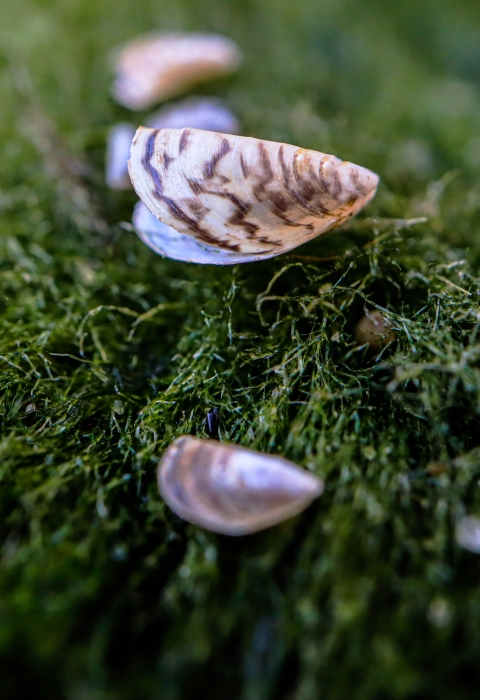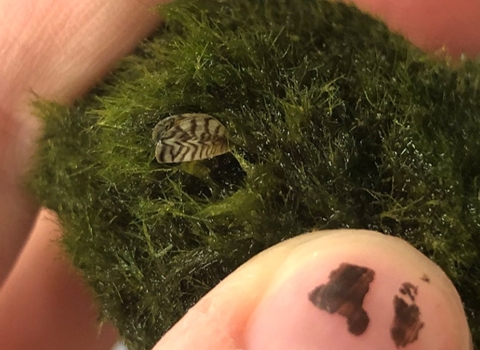On August 5, 2024, zebra mussel-infested Marimo moss balls were detected at an aquarium wholesaler in Washington state. This incident serves as an important reminder to remain vigilant and take action to ensure your aquariums and waterways stay zebra mussel free!
How it started
In 2021, invasive zebra mussels were detected in Marimo moss balls in a Seattle pet store, which launched an international response. Moss balls are a commonly used decorative algae sold in retail stores for use in aquariums, terrariums, and water gardens. Zebra mussels are known as one of the most destructive invasive species invasive species
An invasive species is any plant or animal that has spread or been introduced into a new area where they are, or could, cause harm to the environment, economy, or human, animal, or plant health. Their unwelcome presence can destroy ecosystems and cost millions of dollars.
Learn more about invasive species in North America, destroying ecosystems by disrupting food chains and smothering native species. They can clog pipes necessary for water intake and delivery as well as damage watercraft and infrastructure, requiring costly removal efforts.
Invasive mussels can be spread into water systems in many ways, including by boats, other aquatic organisms, and even inadvertently disposing contaminated aquarium décor down a drain. Zebra mussels are very small and have larval stages that can’t be seen by the naked eye.
How it went
The 2021 discovery initiated an international response involving state, provincial, and federal agencies, Tribes, nongovernmental organizations, and industry. The U.S. Fish and Wildlife Service coordinated with these partners with the goals of stopping the importation of zebra mussel contaminated moss ball products into the U.S. and properly disposing of contaminated moss ball products that were already in the U.S. supply chain.
Since 2021, federal agency partners have been working together to address importation of moss ball shipments that may unintentionally have zebra mussels attached, or within, those shipments.
How it’s going
On August 5, 2024, the Washington Department of Fish and Wildlife was alerted by a local aquarium wholesaler of possible invasive mussels in a shipment of Marimo moss balls. Thanks to the vigilance of these state and industry partners, WDFW was able to quickly respond and confirm the mussels were in fact, zebra mussels. The Washington Department of Fish and Wildlife continues to coordinate with state, federal, and provincial agencies, and Tribes to inform the investigation and aid future prevention efforts.
Read Washington Department of Fish and Wildlife’s News Release: Invasive zebra mussels detected on aquarium Marimo moss balls | Washington Department of Fish & Wildlife
How you can help
This recent discovery has launched a renewed call to action and a reminder to remain vigilant. If you have recently purchased Marimo moss balls from any retailer, you should inspect them for zebra mussels.
If there is any sign of invasive mussels, do NOT dispose of them in drains, waterways, or gardens! Contaminated moss balls must destroyed (either by freezing, boiling, or bleaching), disposed of in a sealed plastic bag in the trash, and your aquarium must be drained and decontaminated.
In response to the 2021 incident, the Service published an informational page on how to inspect, destroy, and dispose of contaminated moss balls safely. Please visit this page for more information: Learn how to inspect, destroy, and dispose of contaminated moss balls
Reports of zebra mussels attached to moss balls should also be submitted to the USGS Nonindigenous Aquatic Species database
And finally, if you have any questions regarding zebra mussels and the safe disposal of moss balls, please contact us.






